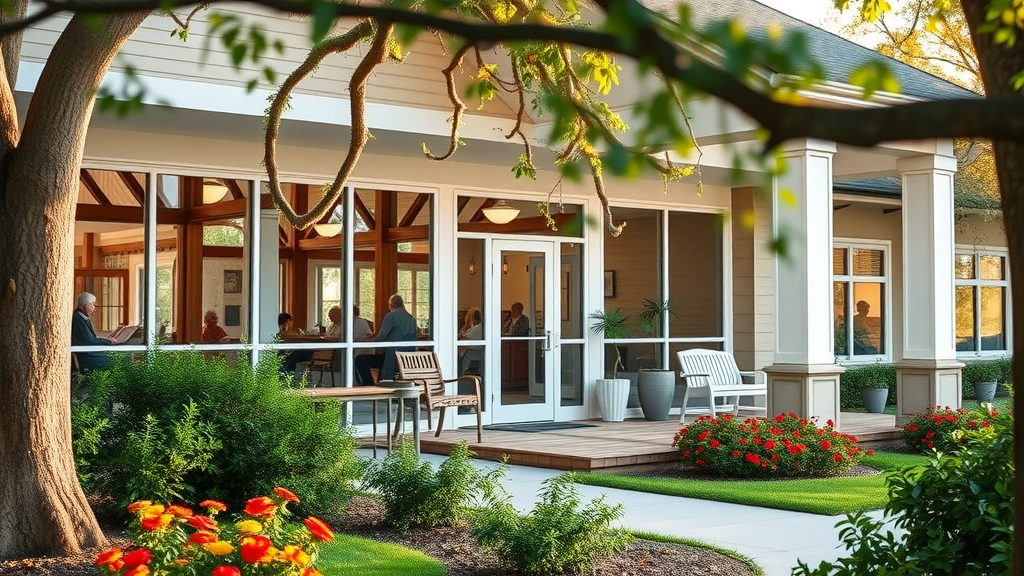Did you know that Louisiana’s senior population is projected to rise by nearly 30% in the next decade? With this unprecedented growth, choosing the right nursing home care in Louisiana could not be more critical. Whether you’re exploring solutions for yourself or a loved one, understanding how regulations, costs, and legal protections work in Louisiana’s long term care landscape is essential. In this guide, discover the realities of senior care, learn how to avoid costly mistakes, and empower yourself to make informed decisions about elder care in the Pelican State.
Revealing the Realities of Nursing Home Care in Louisiana: Why Making the Right Choice Matters
Selecting the right nursing home care in Louisiana isn’t just about finding an available bed—it’s about safeguarding the health, dignity, and quality of life of those you love. With a variety of care options ranging from short term rehabilitation to long term care, Louisiana’s facilities and resources are as diverse as its communities. But with this diversity comes complexity. Medicaid regulations, waiting lists, fluctuating costs, and varying standards of quality require careful navigation. It’s more important than ever to choose wisely amidst evolving healthcare needs, government guidelines, and legal rights.
Across Louisiana, the reality is that quality and protections for nursing home residents vary significantly. Some care centers offer state-of-the-art services and rehabilitation, while others may face compliance issues, or worse, documented neglect. Knowing how Louisiana Medicaid affects admissions, what rights residents hold, and how to spot signs of substandard care directly impacts your loved one’s well-being. As you continue, you’ll gain invaluable insights for evaluating nursing homes, understanding Medicaid’s role, and asserting your rights.
What You'll Take Away from Our Guide to Nursing Home Care in Louisiana
-
The current state of nursing home care in Louisiana
-
Understanding long term and short term care options
-
How Louisiana Medicaid impacts nursing home admissions
-
Legal rights and protections for residents
-
Crucial resources for reporting nursing home neglect

Understanding Nursing Home Care in Louisiana: Key Features and Regulations
Defining Nursing Home Care and Long Term Care in Louisiana
In Louisiana, nursing home care encompasses a spectrum of services designed to assist individuals who require comprehensive health care support and help with daily living. This includes long term care for residents with chronic medical needs and short term rehabilitation for those recovering after a hospital stay or illness. Most nursing homes in Louisiana are licensed and regulated by state agencies, ensuring a baseline of care for residents, yet the type of facility—whether a traditional nursing facility or a skilled nursing facility —involves different levels of care and available support services.
Nursing home residents may require assistance with activities of daily living, such as bathing, dressing, eating, and mobility, as well as ongoing health care management. The choice between long term care and other options—like assisted living or community-based care—depends largely on a patient’s medical status, personal preferences, and available resources. Louisiana’s nursing home system explicitly aims to provide individualized care plans, allowing each resident’s medical and social needs to be met by skilled caregivers, registered nurses, and allied health professionals.
State and Federal Guidelines Governing Nursing Homes
The operation of nursing homes in Louisiana is strictly governed by a framework combining both state and federal guidelines . The Louisiana Department of Health’s Health Standards Section is responsible for licensing, inspections, and monitoring compliance with regulations—ranging from staff qualifications to resident safety and infection control. Federally, nursing homes that accept Medicare and Medicaid funding must adhere to the Centers for Medicare & Medicaid Services (CMS) requirements, covering everything from physical environment standards to resident rights and quality measures.
Regular inspections and quality audits aim to ensure residents receive appropriate care services and that facilities maintain compliance with evolving health care laws. When deficiencies are found, penalties—including fines and stricter oversight—may be imposed. For families, it’s vital to review inspection reports and CMS ratings before making decisions, as these evaluations provide insight into a facility’s compliance history, staffing ratios, and performance measures.
Home and Community Based Services: Alternatives to Nursing Homes
Not all seniors in Louisiana require full-time nursing home placement. Many benefit from Home and Community Based Services (HCBS) , which are designed to help elderly residents receive long term care support in their own homes or community settings. These services can include daily living assistance, transportation, meal delivery, and personal care, providing a viable alternative to institutionalized care for those wishing to maintain independence.
Louisiana’s HCBS programs are supported by Medicaid waivers and local community care center initiatives, offering tailored support to eligible seniors and their families. From adult day care to personal care attendants, the state’s “community based” approach not only helps reduce costs for families, but also improves quality of life by keeping elders connected to familiar environments. As you explore long term care options, consider HCBS as a flexible and person-centered approach—especially for those who do not require 24/7 medical supervision.
"Louisiana ranks among the top states for the fastest-growing elder population, making nursing home care quality more important than ever." – Louisiana Department of Health
Louisiana Medicaid and Nursing Home Care: How Payment and Qualification Work
How Louisiana Medicaid Covers Nursing Home and Long Term Care Costs
Louisiana Medicaid plays a pivotal role in financing nursing home care for thousands of seniors. For qualified individuals, Medicaid can cover all or a significant portion of nursing facility and long term care costs—including room, board, medical care, and necessary daily living assistance. Families often rely on Medicaid to avoid exhausting personal resources, especially since the monthly price of a nursing home or skilled care center can quickly become overwhelming.
Importantly, Medicaid coverage applies to both long term residency and shorter rehabilitation stays following a hospital stay . The program also supports alternative community based services through waivers that permit in-home care and support in community care centers. However, applying for Medicaid can be complex; eligibility, required documentation, and estate recovery provisions make it crucial to work with knowledgeable advisors or legal professionals.

Medicaid Eligibility Requirements for Nursing Facility Services
To qualify for Louisiana Medicaid nursing home benefits, applicants must meet strict Medicaid eligibility criteria. Generally, this includes being over 65, requiring a nursing facility level of care, and having income and assets below the state’s limits. Bank accounts, retirement funds, property ownership, and life insurance policies are all reviewed, and applicants must demonstrate a clear need for skilled care or long term healthcare coverage.
Additional requirements may include assessment of your ability to perform activities of daily living—such as bathing, eating, and mobility. The “5 year rule” (Medicaid’s five-year look-back period) closely examines asset transfers, gifts, or trusts that could prevent Medicaid recipients from qualifying. It’s essential to prepare for the application process, as mistakes or omissions can delay or even disqualify you from receiving much-needed services and supports.
Estate Recovery and Financial Implications for Families
Families should be aware that estate recovery is required by law for Medicaid recipients who have received long term care in a nursing home. Upon the resident’s death, Louisiana may seek repayment of Medicaid benefits from remaining assets—such as homes, bank accounts, and other valuables. This can complicate inheritance plans and financial security for families left behind, particularly if the family home is at risk.
Proactive planning with a trusted attorney and a transparent conversation with care management teams can help minimize potential losses. Knowledge of estate recovery regulations and planning tools—such as irrevocable trusts—empowers families to make informed decisions about eligibility and asset protection. Navigating these financial implications is critical to protecting family wealth and ensuring ongoing access to quality long term care .
|
Program |
Who Qualifies |
Coverage Level |
|---|---|---|
|
Louisiana Medicaid |
Low-income elderly/disabled |
Full or partial |
|
Private Pay |
Anyone |
Full, out-of-pocket |
|
Long Term Care Insurance |
Policyholders |
Partial/Variable |
Exploring Nursing Homes and Skilled Nursing Facilities in Louisiana
Top-Rated Nursing Homes and Care Centers in Baton Rouge and Beyond
Louisiana’s top nursing homes and skilled nursing facilities can be found throughout Baton Rouge, New Orleans, and smaller communities. Many families report high satisfaction with care centers featuring modern amenities, robust activity programs, and engaged nursing teams. When reviewing options, be sure to consider not just the location, but also the center’s history of compliance with health standards, staffing levels, and available medical care.
In Baton Rouge, facilities like St. James Place and Ollie Steele Burden Manor have earned praise for their comprehensive long term care services and commitment to resident dignity. In other regions, look for care centers that provide not just medical attention, but also physical, occupational, and speech therapy on-site, as well as access to local community events for a more vibrant experience.

Comparing Skilled Nursing Facilities vs. Nursing Facilities: Critical Differences
Understanding the difference between a skilled nursing facility and a standard nursing facility is vital. Skilled nursing facilities typically offer higher levels of medical and rehabilitative care, including 24/7 on-site nurses, therapists, and access to physicians. In contrast, some nursing facilities may provide more basic assistance and focus on supporting daily activities rather than intensive medical treatment.
Key distinguishing factors include staff training, the availability of on-site rehabilitation services, the range of healthcare coverage, and the facility’s ability to manage complex medical cases. When considering placement, ensure you ask about the percentage of staff with specialized senior care certifications and how medical emergencies are handled.
-
Location and Reputation
-
On-site medical staff
-
Availability of rehabilitation services
-
Quality measures and violations
-
User reviews and CMS ratings
What the Data Shows: Average Nursing Home Care Costs in Louisiana
Cost Comparison: Long Term vs. Short Term Care
The cost for nursing home care in Louisiana varies based on the type of care required and the facility’s amenities. Average monthly expenses for a private room in a Louisiana nursing home reach as high as $6,500, while a semi-private room averages $5,800. These costs reflect the need for 24-hour support, skilled nursing, and assistance with daily living. In contrast, home and community based services typically cost less, averaging $3,400 per month for in-home assistance and community support.
While short term rehabilitation after a hospital stay may be covered in part by Medicare or private insurance, long term stays depend more heavily on Medicaid or personal funds. It is crucial to compare costs for various providers and consider the full financial impact, including possible out-of-pocket expenses, insurance coverage, and access to financial support programs.
Social Security Contributions to Nursing Home Costs
Many families rely on Social Security to help offset the high expenses of nursing home care . In most cases, eligible residents must contribute the majority of their monthly Social Security income toward their care costs, with Louisiana Medicaid covering the balance for those who qualify. However, this contribution rarely covers the full amount, making Medicaid or long term care insurance critical for most families. Private payers or those without supplemental coverage must prepare for significant out-of-pocket spending unless resources like Medicaid become available.
|
Type of Care |
Average Monthly Cost |
|---|---|
|
Nursing Home (private room) |
$6,500 |
|
Nursing Home (semi-private room) |
$5,800 |
|
Home and Community Based Services |
$3,400 |
Your Rights and Legal Protections in Louisiana Nursing Homes
Resident Rights Under Louisiana and Federal Law
Every resident of a Louisiana nursing home is protected by a robust set of rights under both state and federal law. These include the right to respectful care, freedom from abuse and neglect, participation in developing one’s care plan, and access to personal possessions and communications. The law also protects residents’ ability to voice grievances without fear of retaliation and ensures privacy during medical treatment and visits with family.
Familiarizing yourself with these legal rights can help prevent mistreatment and empower both residents and family members to advocate for proper care. Facilities are required to inform residents of their rights upon admission and post these rights in a visible location. Additionally, the federal “Nursing Home Reform Act” mandates clear standards for quality of life, safety, and dignity—all of which are enforceable through regular inspections, complaint investigations, and legal recourse.

Recognizing Signs of Neglect and Abuse in Nursing Homes
Despite oversight, nursing home neglect and abuse remain pressing issues in Louisiana. Common signs include sudden weight loss, unexplained injuries, poor hygiene, withdrawal from social activities, or the presence of bedsores. Families should remain alert for changes in mood, reluctance to speak openly, or lack of explanation from care center staff regarding a resident's health or safety.
Law requires facilities to have reporting protocols for suspected abuse, and family members should escalate concerns to authorities or experienced attorneys when needed. Vigilance is essential, as neglect can escalate quickly and impact both physical and emotional health. Knowing how to act—and who to contact—empowers families and protects vulnerable loved ones.
"Every resident deserves dignity and respect — vigilance and immediate action are crucial when neglect is suspected." – Elder Law Attorney, Louisiana
How to Select the Best Nursing Home Care in Louisiana for Your Needs
Key Questions to Ask Nursing Home and Skilled Nursing Facility Staff
-
What is your staff-to-resident ratio?
-
How do you handle medical emergencies?
-
Is there a written care plan for each resident?
-
What activities and community-based services are available?
-
Are there any recent violations or complaints?

Resources for Finding and Comparing Community Care Centers
Choosing a community care center or nursing facility is not a decision to be made quickly. Begin by using the Louisiana Department of Health’s online database, which allows you to review inspection scores, reported violations, and certification status for all local nursing homes. CMS’s Nursing Home Compare tool is another excellent resource, offering side-by-side comparisons of quality measures, staffing levels, and user reviews.
Local ombudsman programs and nonprofit senior advocacy groups can provide additional guidance, including personal referrals and support with care plan development. Don’t forget to schedule tours at multiple facilities and ask for contact information of current residents’ families for references. Taking a proactive, informed approach ensures you find a facility that best matches your needs, values, and budget.
People Also Ask About Nursing Home Care in Louisiana
What is the 5 year rule for nursing homes in Louisiana?
The 5 year rule refers to Medicaid’s five-year look-back period for eligibility. When applying for Louisiana Medicaid to cover nursing home or long term care costs, the state examines all asset transfers, gifts, and certain expenditures made within five years prior to the application. If any assets were given away for less than fair market value, Medicaid may impose a penalty period, delaying eligibility. Planning ahead and consulting with an elder law expert is crucial when preparing for Medicaid coverage.
Understanding Medicaid’s Five-Year Look-Back Period and Its Impact on Estate Recovery
The five-year look-back period guards against people transferring assets to qualify for Medicaid. All such transactions are scrutinized to ensure applicants have not tried to shield assets. Violations can trigger extended waiting periods and reduce access to timely care. Additionally, even if a person qualifies for Medicaid, estate recovery provisions allow Louisiana to reclaim costs from the recipient’s estate after death—including proceeds from homes and bank accounts.
Who pays for a nursing home in Louisiana?
In Louisiana, nursing home care can be paid by Medicaid (for eligible low-income residents), by private pay (families or individuals who pay all costs out of pocket), by long term care insurance, or through a combination of Social Security income and supplemental coverage. The source of payment influences eligibility for certain facilities and can affect access to private rooms, on-site enhancements, and specialized services.
Overview of Payment Sources: Medicaid, Private Pay, Insurance, and Social Security
Most families finance care through a blend of resources. Medicaid covers the majority of nursing home residents, while others use Social Security benefits, private funds, and insurance policies to meet costs. Each method comes with its own rules, requirements, and documentation, so understanding the available options is key for sustained care coverage in Louisiana.
What is the average cost of nursing home care in Louisiana?
As of 2024, the average monthly cost for a private room in a Louisiana nursing home is around $6,500, with semi-private rooms at $5,800. Community-based alternatives—like in-home care or adult day care—are typically less expensive, averaging $3,400 monthly. Costs may vary by region, amenities, and the level of skilled nursing required.
Latest Data on Nursing Home and Long Term Care Expenses Across Louisiana
Annual data compiled by senior advocacy organizations and state agencies confirm that costs have risen steadily, keeping pace with staffing demands and care standards. It’s vital to compare care providers and factor in additional fees, such as therapy, special diets, and personal care items, when making financial plans.
How much will Social Security pay for nursing home care?
Social Security payments are typically used as part of the resident’s contribution toward their nursing home care costs. However, they almost never cover the full amount. In Louisiana, Medicaid recipients are required to pay nearly all of their Social Security income to the facility, with Medicaid paying the remainder, minus a small personal needs allowance.
Limits and Guidelines for Social Security Contributions Toward Care Costs
Social Security funds are limited and may not be sufficient for private facilities or those with added amenities. It’s important to budget for gaps between Social Security income and facility charges, seeking additional coverage through Medicaid, insurance, or supplemental community-based services.
FAQs on Nursing Home Care in Louisiana
-
What qualifies as skilled nursing care in Louisiana? Skilled nursing care involves daily medical care such as wound care, injections, IV therapy, and physical therapy that only licensed nurses or therapists can provide, distinguishing it from typical custodial care.
-
Can I use Medicaid for community based services instead of a nursing home? Yes, Louisiana Medicaid offers Home and Community Based Services (HCBS) waivers that can fund in-home or community care for qualified individuals, allowing seniors to remain in less restrictive environments.
-
How do I report elder abuse and nursing home neglect? Report suspected abuse immediately to the Louisiana Department of Health, Adult Protective Services hotline, or consult a qualified nursing home neglect attorney for guidance and legal action.
Key Considerations to Remember When Choosing Nursing Home Care in Louisiana
-
Review Medicaid qualification requirements
-
Tour multiple nursing homes and skilled nursing facilities
-
Seek referrals and check inspection ratings
-
Understand resident rights and legal protections
-
Stay proactive about care and communication
Take Action: Report Suspected Nursing Home Neglect in Louisiana
Why Legal Help from Experienced Louisiana Lawyers is Crucial
Nursing home neglect cases are complex and require swift, knowledgeable intervention. Experienced Louisiana elder law attorneys understand both state and federal protections for residents, and can guide you through the process of reporting abuse, securing evidence, and pursuing justice. Their expertise ensures families receive not only legal support, but also access to advocacy resources and protection from retaliation by facilities.
When facing neglect or abuse, expert legal help can demand accountability from care centers, recover damages, and safeguard your loved one's dignity and rights. Whether you are after financial recovery, a formal investigation, or simply peace of mind, professional counsel is your strongest ally.
Report Nursing Home Neglect - Louisiana Lawyers At stpelaw.com
If you suspect a loved one is being mistreated or neglected in a Louisiana nursing home, don’t wait. Visit stpelaw.com or reach out on Facebook to connect with experienced attorneys who will help you report neglect, investigate your concerns, and fight for the protections every senior deserves. Taking timely action could save lives—and ensure safer, more compassionate care services for all Louisiana residents.

Summary of Nursing Home Care in Louisiana and Steps Forward
When considering nursing home care in Louisiana, it’s essential to understand the various options and financial assistance programs available. The Louisiana Department of Health provides comprehensive information on long-term care services, including nursing facility-based services and home and community-based services. Their resources detail eligibility requirements, application processes, and the types of care provided, helping families make informed decisions. ( ldh.la.gov )
Additionally, the Louisiana Medicaid program offers financial assistance for nursing home care through the Louisiana Options in Long-Term Care program. This program assists eligible seniors in covering the costs associated with nursing facility stays, ensuring that financial constraints do not hinder access to necessary care. ( seniorhomes.com )
For those exploring alternatives to traditional nursing homes, Louisiana’s Home and Community-Based Services (HCBS) Waivers provide support for seniors wishing to remain in their homes or community settings. Programs like the Community Choices Waiver offer services such as personal care assistance, meal delivery, and home modifications, promoting independence and quality of life. ( medicaidlongtermcare.org )
Protecting Your Loved Ones and Accessing Expert Support
Take charge of your family’s future: evaluate all care options, demand transparency, insist on dignity, and seek expert legal guidance when needed—your loved one deserves nothing less. Report Nursing Home Neglect - Louisiana Lawyers At stpelaw.com.
If you’re serious about understanding and navigating nursing home care options in Louisiana, these resources will provide you with the necessary information to make informed and confident decisions.
 Add Row
Add Row  Add
Add 



Write A Comment